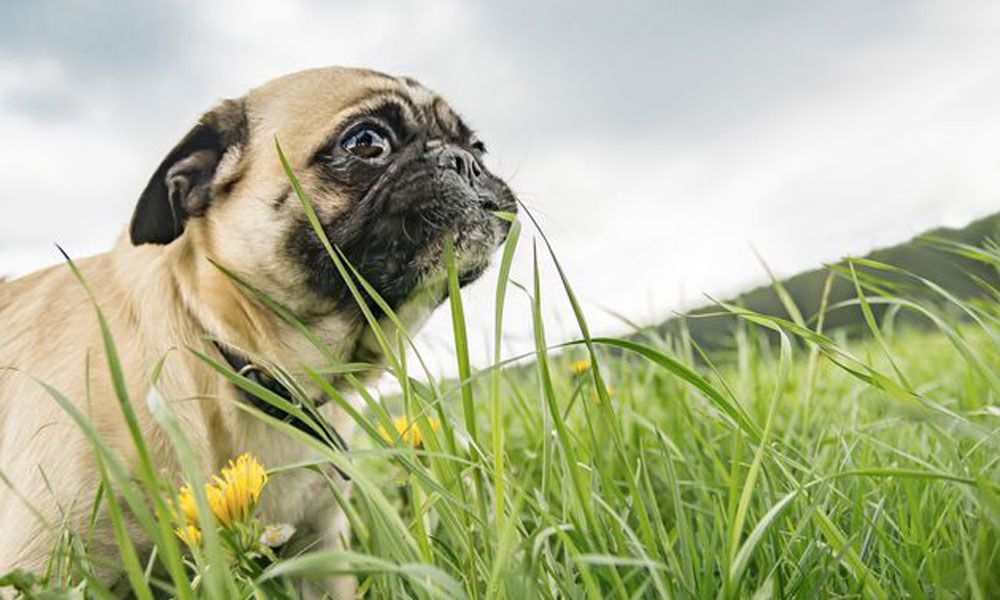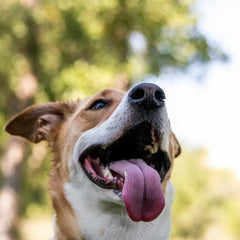It is not uncommon for dog owners in the UK to find their beloved pets munching on grass while out on walks. This behaviour, known as grass-eating or grazing, has puzzled many. In this article, we delve deep into understanding why dogs eat grass and offer guidance on when to seek veterinary advice.
Common Reasons
Understanding why your dog eats grass can help in addressing this behaviour effectively. Here we outline the common reasons behind grass-eating in dogs.
Nutritional Deficiencies
- Fibre deficiency: Some dogs might eat grass to fulfil a deficiency in fibre in their diet.
- Instinctive behaviour: Dogs have evolved from wild ancestors who were accustomed to grazing; hence, it might be an instinctive behaviour.
Boredom
- Lack of stimulation: If your dog is bored and lacks mental stimulation, it might resort to eating grass.
-
Inadequate exercise: Ensure your dog gets enough physical exercise to prevent such behaviours stemming from boredom.

Digestive Issues
- To induce vomiting: Dogs might eat grass to induce vomiting if they are feeling unwell.
- To ease digestive discomfort: Grass can sometimes help in easing digestive discomfort.
Is it Harmful?
Understanding whether grass-eating is harmful to your dog is vital to ensure their well-being.
General Considerations
- Pesticides and chemicals: If the grass is treated with chemicals, it can be harmful to your dog.
-
Parasites: Grass can sometimes harbour parasites which can be transmitted to your dog.
Table: Potential Risks and Solutions
Potential Risks |
Solutions |
| Chemical ingestion | Ensure grass is not chemically treated |
| Parasitic infections | Regular deworming and vet checks |
Preventative Measures
Adopting preventive measures can help in curbing this behaviour in your dog.
Diet Adjustments
- Balanced diet: Ensuring a balanced diet can sometimes reduce the urge to eat grass.
- Increasing fibre intake: Consider increasing the fibre content in your dog’s diet if it is deficient.
Mental Stimulation
- Toys and puzzles: Engaging your dog in activities involving toys and puzzles can help in reducing boredom.
- Training: Regular training sessions can also aid in keeping your dog mentally stimulated.
When to Consult a Vet
Knowing when to consult a vet can be a lifesaver in preventing any adverse effects of grass-eating.
Persistent Vomiting
- Immediate attention: If your dog is persistently vomiting after eating grass, it requires immediate veterinary attention.
- Blood in vomit: The presence of blood in the vomit is a red flag signalling the need for urgent veterinary consultation.
Signs of Illness
- Lethargy: If your dog appears lethargic and shows signs of illness accompanied by grass-eating, consult a vet.
- Diarrhoea: Persistent diarrhoea is another sign that warrants a vet consultation.
Grass-Eating vs. Pica
Understanding the difference between grass-eating and pica can help in adopting the right approach to manage this behaviour.
Definition
- Grass-eating: It refers to the consumption of grass occasionally and is generally considered normal behaviour.
- Pica: Pica refers to the consumption of non-food items persistently, which is a disorder that requires veterinary attention.
Management
- Identifying the underlying issue: Identifying the underlying issue is vital in managing pica effectively.
- Behavioural therapy: In severe cases of pica, behavioural therapy might be recommended.
FAQs
Q: Is it common for dogs to eat grass?
A: Yes, it is quite common and is generally considered normal behaviour unless it is accompanied by signs of illness or distress.
Q: Can grass-eating be a sign of nutritional deficiency?
A: Yes, it can sometimes indicate a deficiency in fibre, prompting the dog to eat grass to fulfil this deficiency.
Q: Is it necessary to stop my dog from eating grass?
A: It is not always necessary to stop your dog from eating grass unless it is causing health issues or if the grass is treated with chemicals.
Conclusion
Grass-eating in dogs is a common behaviour witnessed by many dog owners in the UK. While it can be a normal behaviour stemming from instinct or dietary preferences, it is important to ensure it does not lead to any adverse effects on your dog’s health. Being vigilant about the quality of grass your dog consumes and keeping an eye out for any signs of distress or illness is crucial. Moreover, regular veterinary consultations can aid in managing this behaviour effectively, ensuring the well-being of your furry companion.




